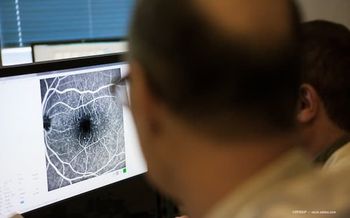
Q&A: Sally S. Ong, MD on the neighborhood-level characteristics associated with delay in surgery and loss to follow-up
Research reveals how neighborhood social factors impact patients with tractional retinal detachments, highlighting the need for improved access to care and support.
Sally S. Ong, MD, presented research on how neighborhood social determinants affect patients with tractional retinal detachments (TRDs) from proliferative diabetic retinopathy at the 2025 American Society of Retina Specialists (ASRS) Annual Scientific Meeting.
Researchers found that patients from areas with higher mobile home prevalence, minority populations, limited vehicle access, and housing cost burden had more severe disease and worse follow-up rates. Patients from neighborhoods with higher disability rates experienced longer surgical delays. Ong recommended that retina specialists consider these factors and connect patients with social workers to improve care access.
Note: The following conversation has been lightly edited for clarity.
Modern Retina (MR): What data did you present at ASRS 2025?
Sally S. Ong, MD: In this presentation, we were looking at associations between neighborhood level social determinants of health with a patient's likelihood of presenting with more severe disease or loss to follow-up, specifically in those patients with tractional retinal detachments associated with proliferative diabetic retinopathy. In this study, we looked at multiple neighborhood-level social determinants of health and their association with baseline severity and loss to follow-up in patients with tractional retinal detachments related to proliferative diabetic retinopathy.
MR: What did this study show?
Ong: Our key findings are that patients who live in neighborhoods with greater mobile home prevalence had higher rates of presenting with foveal involving TRD. And those patients who lived in neighborhoods with again, higher mobile home prevalence, higher proportions of minority status, lack of access to vehicles, and increased household cost burden, defined as spending more than 30% of income on housing. Those patients had higher odds of being lost to follow-up, never returning for follow-up, or having longer durations of follow-up. Lastly, we found that for patients who lived in neighborhoods with more people reporting disability status, these patients had higher odds of having longer periods of time between the decision to have surgery and actually having the surgical repair itself. I think these data show us that neighborhood-level social determinants of health really do influence the severity of the disease when a patient comes to you with tractional retinal detachment related to PDR. On top of that, these factors also influence the likelihood of a patient returning for follow-up, and how long it takes before they come back for follow-up. And as well as you know the time when you decide to put a patient on your OR schedule and when they're actually able to have that surgery. We all know from practice that even if you decide to have patient under go surgery and you've put them on the schedule, sometimes, you know they have to reschedule multiple times before the surgery can proceed. So it just shows that there are all these factors that are somehow out of our control that can influence a patient's access to care. And we know that access to care does influence your surgical outcomes.
MR: How can ophthalmologists and retina specialists put this knowledge to use?
Ong: As a retina specialist, I think that being more cognizant of these factors can help you be a better advocate for your patient. Putting a patient in contact with a social worker if they're having difficulty coming to their appointments, if they have no vehicle access, if they lack support at home, or if they have to care for an individual in their home with who is disabled. I think those things can help your patients get better access to care, and on a more global level, I think these data also help policy makers know that there are social determinants of health that can influence a patient's access to care, that can ultimately influence their health outcomes. There must be some policies put into place that can help these patients do better and get better access.
Newsletter
Keep your retina practice on the forefront—subscribe for expert analysis and emerging trends in retinal disease management.



























